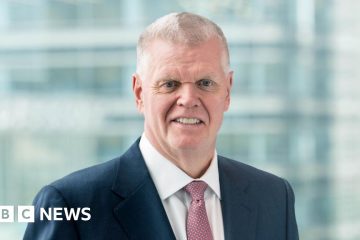The Bank of England has held interest rates at 5.25% but indicated it is edging towards cutting borrowing costs.
At its latest meeting, the Bank said it had discussed cutting rates, with inflation – the pace of price rises – set to fall quickly this year.
But the Bank’s governor said it would wait for firm evidence that inflation was under control before doing so.
But the Bank’s governor said it would wait for firm evidence that inflation was under control before doing so.
However, while Swati Dhingra voted to cut rates to 5%, two members of the Monetary Policy Committee (MPC) backed an increase to 5.5%. The remaining six members voted to keep rates unchanged.
It is the first time there has been a three-way split on whether rates should rise, fall or be held since the 2008 financial crisis.
The Bank has been raising rates steadily over the past couple of years to try to reduce inflation, with the last rate rise in August last year.
Higher interest rates cool inflation by making borrowing more expensive, discouraging people and businesses from taking on debt to fund spending.
Inflation has fallen sharply from a 40-year peak in October 2022 and currently stands at 4%.
The Bank of England has held interest rates at 5.25% but indicated it is edging towards cutting borrowing costs.
But the Bank’s governor said it would wait for firm evidence that inflation was under control before doing so.
At its latest meeting, the Bank said it had discussed cutting rates, with inflation – the pace of price rises – set to fall quickly this year.
However, while Swati Dhingra voted to cut rates to 5%, two members of the Monetary Policy Committee (MPC) backed an increase to 5.5%. The remaining six members voted to keep rates unchanged.
But the Bank’s governor said it would wait for firm evidence that inflation was under control before doing so.
But the Bank’s governor said it would wait for firm evidence that inflation was under control before doing so.
However, while Swati Dhingra voted to cut rates to 5%, two members of the Monetary Policy Committee (MPC) backed an increase to 5.5%. The remaining six members voted to keep rates unchanged.
It is the first time there has been a three-way split on whether rates should rise, fall or be held since the 2008 financial crisis.
The Bank has been raising rates steadily over the past couple of years to try to reduce inflation, with the last rate rise in August last year.
Higher interest rates cool inflation by making borrowing more expensive, discouraging people and businesses from taking on debt to fund spending.
Inflation has fallen sharply from a 40-year peak in October 2022 and currently stands at 4%.
#Bank #England #moving #closer #interest #rate #cut
Note:- (Not all news on the site expresses the point of view of the site, but we transmit this news automatically and translate it through programmatic technology on the site and not from a human editor. The content is auto-generated from a syndicated feed.))



